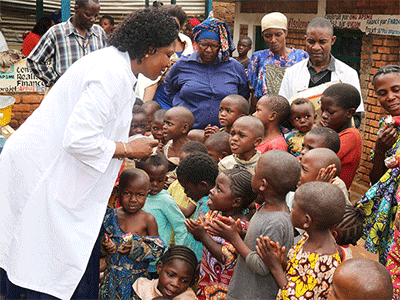In the Democratic Republic of the Congo, initiatives developed by The United Methodist Church aim to offer a positive future to people living with HIV and AIDS.
With funding from the United Methodist Board of Global Ministries’ Global Health program, the church supports more than 100 women living with HIV in Bukavu in the Kivu Conference in eastern Congo. The program also is helping women in Central Congo.
Your support of the World Service Fund apportionment supports program-related general agencies, which are especially important to the common vision, mission, and ministry of The United Methodist Church.
According to Dr. Jimmy Kasongo, medical director of United Methodist Irambo Health Center in Bukavu, the effort is part of the church’s Maternal and Child Health Program in East Congo.
“We help women living with HIV with transportation every week to pick up medicines at Panzi Hospital, which is 10 kilometers (6.2 miles) from Irambo Health Center, where many of these women live,” he said.

According to the National Multisectoral Program for the Fight against AIDS, more than 20,000 people are living with HIV in South Kivu, and the situation is worsening daily. “We need to sensitize the population to get tested to know their HIV status in order to save lives,” Kasongo said.
Exacerbating the problem is the location of the North and South Kivu provinces on the borders with other countries and the violence against women by men in uniform.
The United Methodist Church also provides psychological support to people living with HIV. Through counseling, they gain better understanding of their HIV status, Kasongo said.
To encourage economic independence, The United Methodist Church provides microcredit loans to women living with HIV and guides them to join microfinance associations.
Bénédicte, 41, lives in the Nyalukemba neighborhood of Bukavu. She said the aid helps her to support her family.
“I also received $100 in start-up funds for the sale of embers,” she said. “This allows me to take care of myself, and today I have more than $300. I don’t lack food for myself and my family.” Often used for cooking, embers radiate a more consistent form of heat than an open fire.
Bénédicte said she is no longer marginalized by her neighbors. “Thanks to the help I received from The United Methodist Church,” she said, “I feel integrated into society because I have regained my health.”
United Methodist Bishop Gabriel Yemba Unda, Eastern Congo Episcopal Area, said the support is timely.
“It is a way to put our social evangelization in motion,” he said.
Dr. Marie Claire Manafundu coordinates the Maternal and Child Health Program in eastern Congo. She vowed to continue to advocate for people living with HIV and malnutrition.
excerpt from a story by Philippe Kituka Lolonga, communicator, Kivu Annual Conference.
The World Service Fund provides basic financial support to program-related general agencies, which are especially important to the common vision, mission, and ministry of The United Methodist Church. Through World Service funding, agencies support annual conferences and local congregations in living out God’s mission for the worldwide Church. General agencies also provide essential services and ministries beyond the scope of individual local congregations and annual conferences through services and ministries that are highly focused, flexible, and capable of rapid response.





